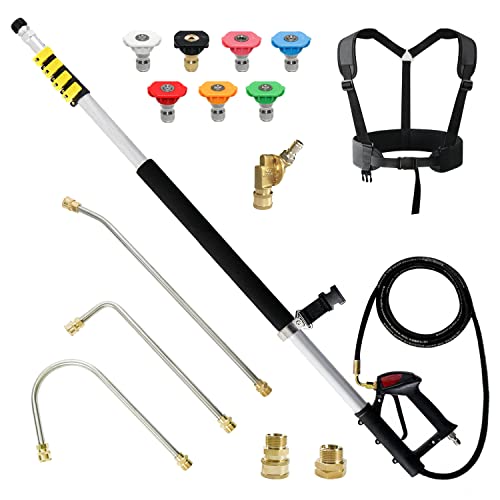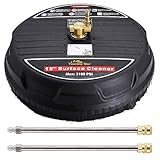Blog
Does Pressure Washing Clean Windows

Pressure washing is a popular method for cleaning various surfaces, but can it effectively clean windows? Many homeowners wonder if pressure washing can provide the same sparkling and streak-free results as traditional window cleaning methods.
Pressure washing involves the use of high-pressure water to remove dirt, grime, and other debris from surfaces. It is commonly used for cleaning driveways, decks, and siding. However, when it comes to windows, there are certain considerations to keep in mind.
While pressure washing can remove dirt and dust from window surfaces, it may not be suitable for all types of windows. The intense pressure can sometimes damage delicate window materials, such as older wooden frames or windows with worn-out seals. In addition, pressure washing may not effectively clean windows with stubborn stains or hard water deposits.
For best results, it is recommended to use a professional window cleaning service that specializes in pressure washing for windows. These professionals have the knowledge and experience to determine the appropriate pressure and technique to safely clean each type of window without causing damage. They also have access to specialized cleaning solutions and equipment that can effectively remove difficult stains and deposits.
In conclusion, while pressure washing can be an effective method for general cleaning purposes, it may not be the ideal choice for cleaning windows. The potential for damage and the inability to achieve streak-free results make professional window cleaning services a better option for maintaining the clarity and appearance of your windows.
Understanding Pressure Washing
Pressure washing is a method of cleaning that uses high-pressure water to remove dirt, grime, mold, and other contaminants from various surfaces. It is commonly used on outdoor surfaces such as driveways, sidewalks, decks, and fences, but it can also be used to clean windows.
Pressure washing windows can effectively remove dirt, dust, and other debris that may accumulate on the surface. It can also remove stubborn stains and streaks, leaving the windows looking clean and clear.
The Pressure Washing Process
During the pressure washing process, a specialized machine called a pressure washer is used. The pressure washer consists of a motor that powers a nozzle, which sprays a strong jet of water onto the surface being cleaned.
The pressure of the water can be adjusted depending on the surface being cleaned. For windows, a lower pressure setting is used to prevent any damage to the glass. The technician will also use a detergent or cleaning solution specifically formulated for windows to ensure a thorough clean.
The Benefits of Pressure Washing Windows
Pressure washing windows offers several benefits:
- Efficiency: Pressure washing can quickly and effectively clean large areas of windows.
- Ease of Use: Pressure washing is a relatively easy and straightforward process that does not require a lot of manual labor.
- Improved Aesthetics: Clean windows can greatly enhance the overall appearance of a building or home.
- Longevity: By removing dirt and contaminants, pressure washing can help prolong the lifespan of windows.
It is important to note that pressure washing should be done by a trained professional to ensure that the windows are not damaged during the process.
Overall, pressure washing is a highly effective method of cleaning windows and can produce satisfactory results when done correctly. It is a convenient and efficient way to maintain the cleanliness and appearance of windows without the need for manual scrubbing.
Pros and Cons of Pressure Washing Windows
Pressure washing is a popular cleaning method that is often used to clean various surfaces, including windows. While it can be an effective way to remove dirt and grime from windows, there are pros and cons to consider before using this method.
Pros:
- Efficiency: Pressure washing is a quick and efficient way to clean windows, especially when dealing with a large area or heavily soiled surfaces. It can save both time and effort compared to traditional cleaning methods.
- Thorough Cleaning: The high-pressure water stream used in pressure washing can reach areas that are difficult to clean manually, ensuring a thorough cleaning of the windows.
- Removes Tough Stains: Pressure washing can effectively remove tough stains, such as oil or grease, that may be difficult to remove with other cleaning methods.
- Powerful Cleaning: Pressure washing can provide a more powerful cleaning action compared to traditional cleaning methods, which can result in cleaner and brighter windows.
Cons:
- Potential for Damage: The high-pressure water used in pressure washing can potentially damage windows, especially if the pressure is set too high or if the windows are old or fragile. It is important to use the correct pressure settings and techniques to prevent damage.
- Water Intrusion: If not done properly, pressure washing can cause water to enter the interior of the window frames or even inside the building, resulting in potential water damage or mold growth.
- Professional Expertise: Pressure washing windows requires knowledge and expertise to ensure the process is done safely and effectively. It may be necessary to hire a professional pressure washing service to avoid any potential damage or risks.
- Cost: Pressure washing windows can be more expensive than traditional cleaning methods, especially if professional services are required. The cost of equipment, cleaning solutions, and potential repairs should be taken into account.
Overall, pressure washing can be an effective method for cleaning windows, but it is important to consider the pros and cons before deciding to use this method. It is recommended to assess the condition of the windows, seek professional advice if needed, and take necessary precautions to ensure a safe and successful cleaning process.
Alternative Window Cleaning Methods
While pressure washing is a popular method for cleaning windows, there are alternative approaches that can be just as effective. These methods offer different advantages and may be preferred in certain situations or for specific types of windows.
1. Traditional Squeegee Method
The traditional squeegee method is a tried and true technique for cleaning windows. It involves using a squeegee tool with a rubber blade to remove dirt and grime from the glass surface. This method is often preferred by professional window cleaners because it allows for precise control and can deliver streak-free results.
To clean windows using the squeegee method, start by wetting the glass with a soapy solution or glass cleaner. Then, position the squeegee at the top corner of the window and pull it across the surface in a smooth motion, removing the cleaning solution as you go. Wipe the blade with a clean cloth after each stroke to prevent streaking.
2. Vinegar and Newspaper Technique
If you prefer using natural cleaning solutions, the vinegar and newspaper method can be a great option. Vinegar has natural cleaning properties that can effectively remove dirt and grime from windows, while the newspaper acts as an absorbent material to leave the glass with a streak-free shine.
To clean windows with vinegar and newspaper, mix equal parts vinegar and water in a spray bottle. Spray the solution onto the glass and then wipe it off using crumpled newspaper. The ink on the newspaper helps to lift and absorb dirt, leaving behind clean and shiny windows.
When using this method, it’s important to avoid using colored or glossy pages, as they can transfer ink onto the glass. Stick to plain black and white newspaper for the best results.
While pressure washing can be an effective method for cleaning windows, it’s not the only option. The traditional squeegee method and vinegar and newspaper technique offer alternatives that can deliver excellent results. Consider trying out these methods to find the one that works best for you and your windows.
Questions and answers
Can pressure washing effectively clean windows?
Yes, pressure washing can be an effective method to clean windows. The high-pressure water stream can remove dirt, grime, and other debris from the surface of the windows.
Is pressure washing safe for all types of windows?
Pressure washing may not be safe for all types of windows. The high pressure can potentially damage delicate glass or window frames. It is important to consider the type of windows before using this method.
What are the advantages of pressure washing windows?
There are several advantages to pressure washing windows. It is a quick and efficient method to remove dirt and grime from the windows, resulting in a clean and shiny appearance. It can also be a cost-effective solution, as it eliminates the need for expensive cleaning products.
Are there any disadvantages of pressure washing windows?
While pressure washing can be effective, there are some disadvantages to be aware of. As mentioned earlier, it may not be suitable for all types of windows and can potentially cause damage. Additionally, water pressure that is too high or incorrect technique can lead to water getting inside the house or causing other problems.
Are there alternative methods to clean windows?
Yes, there are alternative methods to clean windows. These include using a squeegee and window cleaning solution, vinegar and water mixture, or hiring professional window cleaners. These methods provide more control and are often safer for delicate windows.
Does pressure washing remove dirt and grime from windows?
Yes, pressure washing is an effective method for removing dirt and grime from windows. The powerful stream of water can easily dislodge and wash away any buildup on the surface of the windows.
Recent Posts
-
How To Connect Soap To Honda Pressure Washer
June 28, 2024 -
A To Z Pressure Washing Scam
June 27, 2024 -
How To Pressure Wash Your Home With A Garden Hose
June 27, 2024 -
Where Can I Buy Honda Pressure Washer Parts
June 25, 2024















